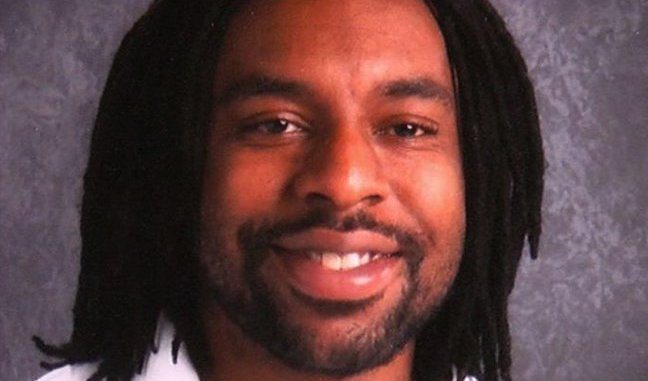I was born with bad eyesight.
I have one eye that is not horrible, it is around 20/80, but in my other eye I am legally blind. However, I have lazy eye in the good eye so my body primarily uses the bad eye. Basically, I am blind in one eye and can’t see out of the other.
All of my life I have had to wear glasses in order to see the world clearly. In fact, three out of four people in the United States wear some kind of corrective lenses, whether glasses or reading glasses or contact lenses. The vast majority of us need some help to see the world around us more clearly.
While most of us need glasses to improve our physical vision, all of us need help to learn how to see the world as God sees the world. We all need to learn how to see one another like Jesus.
In Matthew 14, Jesus had just learned that his cousin, John the Baptist, was brutally executed through the influence of the king’s sister in law. John, a faithful, religious man, the one who baptized Jesus, was beheaded.
The crowd.
Crowds of people made it around the lake and got there before Jesus, looking for a healing miracle, listening for a teaching, wanting for something to eat.
Jesus just wanted to get away from it all, and there was the ever-present crowd, just wanting more from him.
Have you ever been in a situation like that when you just need a break and the phone keeps ringing or people keep calling your name or the kids ask from you or the boss wants from you and life just won’t give you a break?
When we are there, it is easy to begin to look at the people around us as a drain, as a source of stress, as someone else wanting something from me, taking my time and my energy.
We begin to look at the people around us as obstacles to be overcome.
Jesus doesn’t do that.
Despite the fact that he is stressed out and the crowd wants from him he doesn’t look at them as if they are a burden, he looks at them with compassion.

He doesn’t see them as needy, he sees them with compassion.
Through the eyes of compassion he provides for them, he heals the sick, teaches, and feeds.
He does all of that, because he starts from a place of compassion. Jesus looks at people through the eyes of compassion.
How do we look at people?
We start by observing the outside.
A Harvard University study found that brain scans show that the first things we notice about someone when we look at their face is their race and their gender. We look at a person and the first thing we notice is the color of the skin and whether it is a man or a woman.
This is a natural, evolutionary response.
But then from there, our brain not only makes this initial observation, but assigns meanings to the observation. We make assumption about people based on whether the person is a man or a woman. I know that if I go to get my car worked on, I will often get a different response than my wife. That kind of stuff drives me crazy and I hate it, but that is the world that we live in.
And we not only make assumptions about someone because of their gender, but because of their race.
We saw it again this week in the exoneration of the police officer who killed Philando Castillo. Castillo was not only brutally shot in front of his family and killed, but he had been pulled over 52 times in his life for minor traffic violations.
52 times.
This is someone who was a model citizen, who worked at a school, who had a quiet and unassuming personality, who was described by the students of the school as “Mr Rogers with dreadlocks”.
But because of the color of his skin he was pulled over 52 times and killed.
This is how the world looks at people. We look at someone and judge them as a threat by their appearance.
The world has conditioned us to look at each other as opposites and to categorize. Rich and poor, black and white, male and female, gay and straight.
While this is how we look at the world, this is not God’s design.
On the first page of the Bible, in Genesis, Chapter 1, it says “God created humankind in his image, in the image of God he created them; male and female he created them.”
Every person is created in the image of God. Every face you see in this room reflects something different about who God is.
The person who is different from you is not a category to be labeled or feared, but is a sister or brother in Christ who has been created in God’s image. It is in the diversity of humankind that we see a little more clearly who God is.
The invitation we have is to begin to see one another not as our culture and society teach us to see where we divide people by race, color, creed, sexuality, and national origin, but to see each other as God sees us, to see Christ reflected in the eyes of the stranger, to look with the eyes of compassion.
So how do we do that, how do we get compassionate eyes? How do we learn to see each other as God sees us?
Unfortunately it is not as easy as going to the eye doctor and getting a new pair of glasses with compassion lenses.
Often, the way we begin to see others differently is when we go through some struggle and suffering ourselves.
Remember, that this scripture follows right after Jesus has learned of the execution of John the Baptist. Jesus has lost a cousin in a horrific way. He is mourning, he is grieving, so when he comes upon this crowd of people who are hurting, Jesus is hurting himself. It is the fact that he is going through some stuff himself that he is able to have compassion for others who are going through some stuff.
This compassion that Jesus shows is deep.
The Greek word for compassion, splagchnizomai, means to be moved at the very depth of our being. It is a gut-wrenching compassion. Splagchnizomai is not looking at someone from a distance and having pity for them. It is not about looking down on someone and saying how unfortunate they are, to look with compassion is to connect their struggle with your own and know that we are all united together in Christ.
In the world’s eyes we are very different. One of the things that makes us special as the Church for All People is our diversity. And yet, one thing that we have in common is that we all have been through some stuff.
We have all mourned the loss of someone we loved.
We have all faced addictions of one kind or another, whether to a chemical substance or to our pride and ego.
We all know what it feels like to be rejected and to have experienced a broken relationship.
We all know what it is like to just have a bad day.
When we are able to be honest with ourselves and recognize our own brokenness, then we can be compassionate about the struggles of someone else.
However, our temptation is to forget where we have come from. We look at the other with judgmental eyes, not remembering that we were there 10 years ago or recognizing how much God’s grace has changed us.
What would it look like to see a person behaving badly through the eyes of compassion?
It would mean seeing the person for who they are and not defining them by their behavior.
 When you see the person behaving in a way that you would consider wrong, that person is not their behavior. That person is a child of God and their behavior comes from a place you probably know nothing about. We all share a lifetime of pain and struggle and abuse and suffering.
When you see the person behaving in a way that you would consider wrong, that person is not their behavior. That person is a child of God and their behavior comes from a place you probably know nothing about. We all share a lifetime of pain and struggle and abuse and suffering.And we have all been hurt.
When we can see our hurts and can be understanding of another person’s hurts, than we can begin to look at one another through the eyes of compassion.
And when we can do that, amazing things can happen.
The rest of this scripture is the familiar story of the loaves and fishes.
The disciples see the hungry crowd and instead of looking at them through the eyes of compassion they look and see mouths that need to be fed. They ask Jesus to send them away, but instead Jesus says you feed them. They argue that they don’t have enough. But our God is not a God of scarcity but a God of abundance. There is more than enough. From the five loaves and two fish thousands are fed with 12 baskets of leftovers.
But the full miracle here is not only the miracle of abundant food, but the miracle of abundant compassion.
Our fear of scarcity is not limited to having enough money or food or stuff, we also often think we may not have enough love or kindness or generosity or compassion. o much so that we try and protect our pride by putting limits on how much forgiveness we are willing to show or understanding we are willing to extend.
But our God is not a God of scarcity, but is a God of abundance!
The more we show love, the more we receive love in return.
The more we offer forgiveness, the more we are forgiven.
The more we extend compassion, the more compassion spreads like a ripple effect across our community and our world.
The more we look at one another and see God in the eyes of the other, even in the person who makes us most uncomfortable, the more we are a part of God’s work of creating a world where people are seen for the content of their character instead of merely for the color of their skin.
My prayer for us today is that we will all get some new glasses, that we will see each other differently, that we will look at each other with eyes of compassion.






